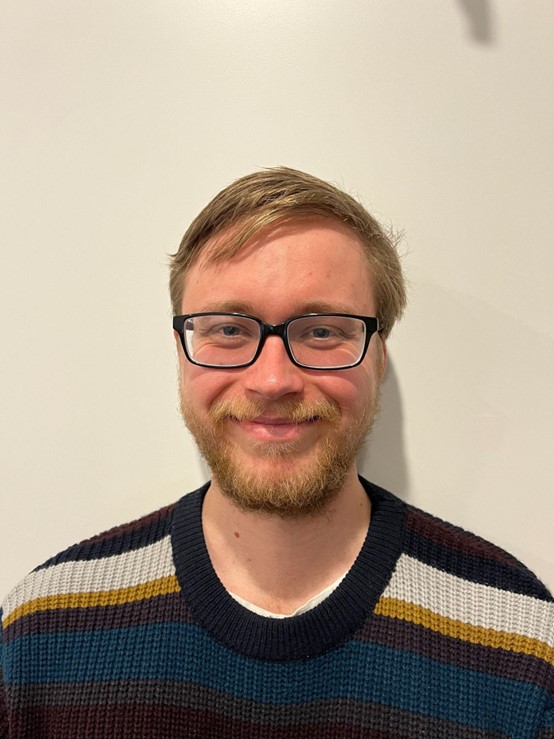Chris Hone
The University of Sydney
Chris Hone grew up in Canberra, and studied Math at the Australian National University. After this he was lucky enough to get a PhD position at Sydney starting in 2021, with Geordie Williamson as his supervisor. When not doing math, he can be found outside, hiking, climbing, and exploring the Australian bush.
Can you give me a quick overview of the type of mathematics you are studying and its potential impacts for the broader community ?
The maths I study is broadly representation theory, which studies how much information we can learn about complicated mathematical objects by turning them into linear algebra, something we understand really well. In my neck of the woods, these representations arise from geometric objects, and the suite of geometric tools we have for understanding them is immensely powerful, and I’m principally trying to understand how to generalise and understand these tools. Mathematical tools always filter downstream to other sciences, and while it’s difficult to predict what may be useful, clear understanding and recognition among mathematicians is an important first step.
How did you get into mathematics and into the area of Representation Theory? Was there someone or something that inspired you to this field?
After high school, I was originally going to study something else, but I found myself drawn to tricky math problems in my gap year, which was a strong sign that I should pursue it! More specifically, I’ve been fascinated by the complex representation theory of finite groups ever since I first learnt it from Zsuzsanna Dansco in my first year at ANU. I regard it as one of the most beautiful theories that mathematics has to offer, a jewel of singular brilliance within representation theory more broadly.
You received a grant to attend AMSI Winter School 2022. How important was this in terms of your ability to attend, fully participate in the program and meet others studying in similar fields?
The grant was key to my ability to attend and fully participate in the program, enabling me to use my time more effectively to converse with other people. Something as simple as being able to go out to lunch without financial worry, and having these all important, off hours conversations, was incredibly beneficial.
Winter School is designed to give students a deeper understanding of their area of research and expose them to others working in different fields/industries. What was the most valuable part of the program for you? Was it the course content or the people you met? Do you have new ideas for your work/research or see it in a new light?
I find that in the context of learning mathematics, speaking one on one to an expert is 20 times more efficient than reading from a textbook or paper, and for me the most valuable aspect of the winter school was enabling these discussions with a much wider circle of people. Being able to talk at length with the lecturers was immensely helpful in understanding the material covered, and being able to talk in depth to other students about their area of speciality was a fantastic learning experience. On a specific note, the algebraic groups course showed me the value of a structural approach to the theory of algebraic groups, even if one is really only interested in reductive groups. This idea of finding the right general objects and properties, to encapsulate your special objects, enabling one to work inductively, has been invaluable for my own research.
AMSI-MSRI Winter School was held as a hybrid event with event hubs in Australia and America. What was the biggest positive from your point of view holding it in this format and/or the biggest challenge?
The biggest challenge with this dual setup I found was the difficulty of collaborating/discussing with those overseas. One really had to make the effort in this regard, and the lack of spaces enabling technical discussion made it harder to work on the problems presented.
What advice would you give to someone who is considering applying for Winter School in 2023? How would you describe the conference to them? Should they apply and why?
You should apply! It was basically two weeks of learning interesting math, talking to interesting people, and enjoying the warmth of midwinter Brisbane. The wide variety of people present can also help you with understanding things, so even if you don’t feel fully prepared, you’ll still get a lot out of it. In this way, it’s a very beneficial learning environment.
Where do you want the mathematical sciences to take you? Where do you see yourself in five, ten years time?
I would like to see myself in many years time with a beautifully clear theory, the fog of mystery finally lifted, revealing the elusive underlying simplicity of the problems which occupy my thoughts. On a practical note, I would want to be employed, in a position that values both teaching and research, wherever I can have good conversations with those down the hall.
Any other feedback/comments you would like to provide on the AMSI Scholarship or AMSI-MSRI Winter School 2022?
One specific thing that I think would help with online collaboration in the future would be having an online space to discuss specific problems.


